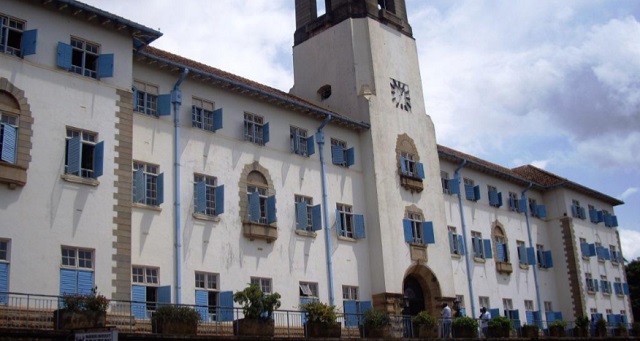
Kampala, Uganda | THE INDEPENDENT | Makerere University on Thursday celebrated 100 years of existence with calls to deepen the focus on science and research.
Established by the colonial government as a small technical institution back in 1922, the institution which had 14 students studying in grass-thatched huts has risen to be one of the most prestigious universities in Africa, seeing thousands of graduates from its gates. The university now boasts of 35,000 students across its 15 colleges and institutes.
During the centenary celebrations held on Thursday, speaker after speaker praised the institution for its contribution towards the development of the region. They however highlighted that moving forward, there is a need to put much attention to relevant innovations and research which can be used to transform lives and solve several challenges affecting people in their communities.
Prof. George Mondo Kagonyera, the former chancellor of Makerere lifted the veil on the call. Kagonyera praised President Yoweri Museveni for his call to put more emphasis on science and research other than humanities.
Giving an example of what has already been achieved by Makerere through areas of health and agriculture, Kagonyera noted that if research is prioritized everywhere, it can bring about tangible results, not for Makerere and Uganda alone but even the entire world.
The Minister of Education and Sports, Janet Kataha Museveni also pointed out that while the country commemorates the significance of the past 100 years of Makerere, it is high time the institution spearheaded homegrown solutions to Uganda’s problems.
“We must leverage the vast experiences to spur national development. We need to restore what has been broken to set a new path for future generations. I challenge Makerere to step out of the past and intentionally seek to provide solutions to society’s needs. As a government, we are committed to supporting you in this endeavor,” read her letter presented by Minister John Chrysostom Muyingo.
President Museveni noted that history shows that innovations and development strides at initial stages such as discovering fire were in Africa, but the continent is now stuck with few or no innovations being invented to give solutions to challenges faced by locals.
Museveni said that as Makerere celebrates 100 years, there should be a critical audit to understand why Africa is lagging behind and how to move forward. But he said to unlock the potential that Africans had developed centuries ago, research and science should be at the forefront thus reiterating his call for Makerere University to focus mainly on science and research to help solve the country’s problems.
Museveni also recognized the college of health sciences for a number of important outputs they had created over the years. Using these instances, the President justified that where science has been applied, there has been good progress.
The President noted that he still believes that scientists should be paid more to challenge those in arts and humanities to also show off their efforts to solve the country’s problems. In recent years, Makerere university has been witnessing an increase in research and innovation output which according to Prof Barnabas Nawangwe, the University Vice-Chancellor, has been aided by the steadily increasing research budgets both from government and partners.
However, academicians and community members have already pointed out that the university is presently facing a problem in translating research and breakthroughs into services and products that would benefit the community.
The issue was highly noted during the recent 72nd graduation ceremony with calls to ensure that the new knowledge or innovation made doesn’t remain in laboratories or university libraries where they gather dust for years.
Lorna Magara, the University Council Chairperson noted that the university’s management hopes to transform the institution into a hub for research and innovation as it enters the next century.
Magara said that the university should be known by its research outputs rather than the strikes of both students and staff. She also added that the council has already developed concepts of setting up hubs that will be opened to not only the students and members of the faculty, but also embrace all innovators including those drawn from the informal sectors.
Professor Ezra Suruma, the University Chancellor advised that as the university puts emphasis on science, research, and innovation, there is a need to pay attention to the ethical content of education. Prof Suruma noted that the character of the students who passed out of the universities is as important as their technical knowledge.
Thomas Tayebwa, the Deputy Speaker of Parliament urged individuals who have passed through the gates of Makerere to assist their alma mater by contributing to the endowment fund.
The event held at the Freedom Square marked the conclusion of a year long celebration that focused on looking at the history of Makerere, honoring the great men and women on whose shoulders the institutions have stood firm, and visualizing the future they aspire.
In its hundred years, Makerere university has graduated hundreds of thousands of professionals. The institution has also produced former African leaders including Mwai Kibaki from Kenya, Julius Nyerere, and Benjamin Mkapa both from Tanzania, Joseph Kabira of DRC, and Yusufu Lule, Godfrey Binaisa, and Milton Obote.
*****
URN
 The Independent Uganda: You get the Truth we Pay the Price
The Independent Uganda: You get the Truth we Pay the Price




We observed a request to fund certain category of students by the deputy speaker
This should be supported by Research
Numbers of students on government sponsorship and the corresponding schools attended is not enough to justify action
There should be questions to be answered
And the methods to be generated are likely to be “mixed”
If funding targets science based subjects and score:
Where are the voices of those who miss the funding?
What factors determine who qualifies?
How did the current important persons in the country attain education to qualify for the
positions that they hold?
There is an endless list of questions
Otherwise, the status quo is like treating headache without determining the cause
The answers tend to be stronger when those who interact with society get involved, and even better refined when voices of those who benefit from affirmation action are factored in